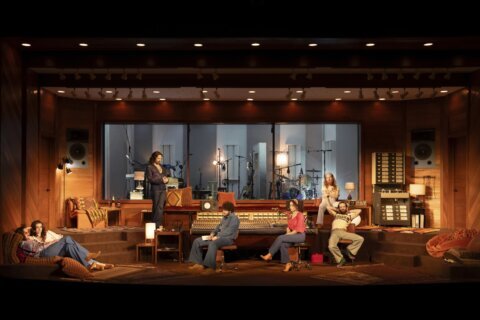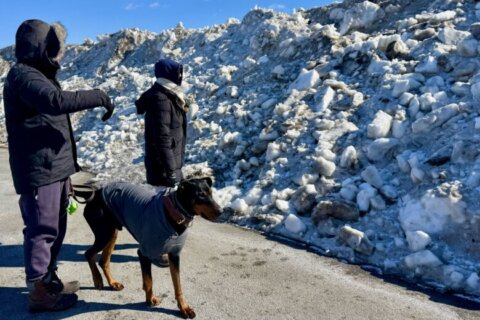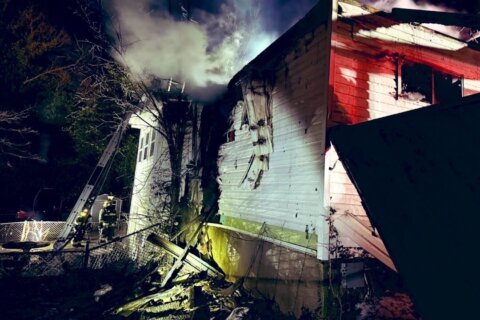This video is no longer available.
At-Large D.C. Council member Robert White has his sights set on the executive office and is vying to unseat Mayor Muriel Bowser.
White is going up against Bowser, fellow council member Trayon White (who did not respond to WTOP’s requests for an interview) and James Butler in the June 21 primary.
White spoke with WTOP’s Mike Murillo about the issues in this year’s race.
Editor’s note: This interview has been edited for clarity.
- Meet the candidates for DC mayor: Muriel Bowser
- Meet the candidates for DC mayor: James Butler
- Meet the candidates for DC mayor: Rodney ‘Red’ Grant
- Meet the candidates for DC mayor: Robert White
- Meet the candidates for DC mayor: Stacia Hall
- DC primary voter guide
- Local Politics and Elections News
- More DC News

White’s plan to combat crime
We’ve seen a lot of horrible tragedies. I’ve been to funerals of young people. This is a level of violence that I saw when I was growing up here in a city and now I’m the dad of two young girls seeing the same level of violence.
That’s why I’ve taken seriously, in my job as future mayor of the city, (the development of) a public safety plan that I’m ready to implement on Day One. Our police are going to be more responsive, because we are going to focus their resources on public safety. We’re gonna stop using police as a catchall agency.
The additional people we hire will be people who can deal with the issues of mental health issues, noise complaints, traffic enforcement — that’s not where we need our public safety officers. We need them patrolling, responding, closing cases.
But as much as my job is to prevent crime, if we want to keep people safe, we have to prevent crime. So you’re gonna see a significant increase in crime prevention, violence interruption programs. We will have a fourfold expansion and we will coordinate efforts so that we are stopping crime before it happens by reaching the people who are committing the crimes, giving them a clear alternative, a clear exit path off the path of violence. If they don’t take that, there will be consequences, accountability, but we have to prevent crime.
And when crime happens, unfortunately, we are going to get resources to victims of crime, including mental health resources to young people. We’re going to stop the cycle of violence; we’re going to take a full-government approach to public safety.
Changes for DC police
First, we need an audit to understand how many police officers we need and where we need them. Just suggesting we need more police officers is not a plan, so we need to know how many police officers we need in our city and where we need them.
As I mentioned, we also have to take a very different approach to where we’re using our public safety officers. We don’t need armed city employees conducting all of our traffic stops. We don’t need armed city employees taking the lead on mental health complaints and noise complaints. We have to hire other people to take the lead on that.
Efforts to reduce traffic fatalities
This speaks very much to the difference in my approach on governing versus the incumbent. We are not going to rely on gimmicks and hashtags. Vision Zero was never a plan. Vision Zero, unfortunately, is a gimmick.
We’re going to reduce traffic fatalities by making the necessary infrastructure changes, things like raised crosswalks, protected bike lanes. We’re going to set clear goals, but we’re also going to measure our work so that when we develop a policy and it is not working, we are going to change course.
We are years into Vision Zero; we are worse off than when we started. That is unacceptable. That represents a lack of engagement and policy and a government that is not performing at an optimal level.
We have to take the issue of people dying unnecessarily in our streets, being injured in our streets — we have to take that seriously. These are lives that did not have to be lost. And we can’t tolerate this.
Speed cameras
Speed cameras have a place. I believe that they have become predatory and have not been used to serve the really underlying issue of reducing traffic fatalities. They are over-concentrated in low-income neighborhoods, Black neighborhoods. What we need to do is use them as appropriate.
I think we need red light cameras. We need to stop turning right on red, and for the traffic cameras, we need to use them as a safety measure, not as a moneymaking measure, which is what we have done for the past several years.
Economic recovery from the pandemic
The first thing we have to remember is that the disparities that we’ve seen during the pandemic are disparities that existed before the pandemic, so we’ve got to get serious about these issues, disparities in health access, grocery access, jobs, schools, mental health resources. We have to address those underlying disparities. We can’t run away from these issues; we have to run to them.
But we also need our economy to remain strong and get stronger. That means that we have to know that downtown tomorrow is not going to be the downtown of yesterday.
Where I’m going to focus is bringing more residents downtown, focusing particularly on workforce housing and low-income housing, but housing for the people who move our economy, who work in our tourism and hospitality industries. The industries that anchor our economy have to be able to live in our city.
And we’re going to make the District of Columbia a destination for virtual workers. A lot of people don’t have to work in the office anymore. That doesn’t mean they’re working at home. We want them to work downtown, in the neighborhoods in D.C. This is how we prop up our economy.
And we’re going to support our local businesses so our local entrepreneurs that want to start businesses, grow businesses — we’re going to give them the resources and incubation space to do that.
Affordable housing
As mayor, I’m going to set a very clear vision for our city, a vision that includes people from all incomes. I’m a native Washingtonian, a fifth-generation Washingtonian, who has seen almost my entire family priced out of our city because we have not had a clear focus on everyday people and people with lower incomes. That’s going to be my primary focus. I’m going to have a very serious conversation with the development community and let them know if they want to be members of our community, they have to start focusing on the housing we need.
The housing we need is multifamily housing, senior housing, housing for CVS clerks who make $40,000 a year, housing for government workers who make $50,000 and $60,000 a year. That is not what we have been building over these past two decades, but that is what we need to, and as our mayor will, build over the next decade so that this is an inclusive city.
I’m also going to take a different approach to how we develop housing on our public lands, looking at new concepts like community land trusts and social housing.
We can’t keep doing the same thing and hoping that somehow, one day, it’s going to have a different impact. We have displaced too many people from our city; we have prevented too many young families from living in our city. That must change.
As mayor, that is the strategic vision I’m going to set for our city, and I’m going to use the strength of the office to make that vision a reality.
Federal infrastructure funding
This record-setting amount of funding that we’re going to get from the federal government has to be a game-changer for the District of Columbia. With the incumbent, what we will see is, the same businesses that have gotten contracts — they’re going to get contracts.
What we need to see is an opportunity for growing our local businesses, for getting our residents employed into careers and utilizing this funding to do major infrastructure work, roads, bridges, sewers, internet — work that has been delayed for too long in the District and across the nation.
We have to get that work done, but we can also use this, and must use this, as an opportunity to open up lines of transportation to neighborhoods that have been isolated for decades because of, frankly, racial bias in planning, particularly in transportation, over the past several decades.
We have to utilize this as really a catapulting opportunity for the District. We can’t just take this money, spend it the way we have, and hope for real changes. This once-in-a-lifetime infusion of cash has to mean a change of opportunity for people, businesses and communities that have not seen it over the past several decades.
Nobody can do this work by themselves, and as mayor, what I’m going to do is bring in the best and brightest that our city has to offer to help me tackle these issues, making sure that we have the right people leading every one of our agencies — people who are qualified, not people who necessarily have the right relationships, or donated to the right campaigns. The people who can move our city forward, who are ready to operate our city, who move with a sense of urgency — that’s what we have to do.
But we also have to inspire hope in our city. We have had a deficit of hope in our city for too long. We are seeing our young people spiral; we are seeing our seniors lack faith and hope in our government, and that doesn’t give us anything to build on.
As we build the next decade of our city, we can only build that on trust and hope, and so my challenge in the early days of my administration is going to be to rebuild that hope and inspire our city to greater heights.
Working with the council
This is one of the most exciting opportunities going forward. The council and the attorney general have, for many years, been very hungry for an opportunity to work with a mayor. Our current mayor has a “my way or the highway” mentality, and has not accepted helpful cooperation from the council, the attorney general and many communities.
But I recognize that the challenges in front of us are so significant that no one person can do it. So as soon as we win this election, I’m calling on the council and the attorney general to work with me to achieve this ambitious vision for our city.
You will see the council working as a partner with the mayor. I’m going to set a strategic vision for our city, but I’m going to call on the council to work with me to achieve that vision. And I’m going to respect their voices and their knowledge, and that’s going to be a significant change from what we’ve seen over the last eight years.
Commanders in D.C.
We can’t put government dollars into that. And as a lifelong fan of our team, I would love to see the Commanders back in the District. But I’d first like to see my dad be able to move back into the District. So I recognize that housing is the more urgent need for our city. That’s where our focus has to be, not on a football stadium.
What sets White apart
One, I am rooted in the issues that impact our city. Issues of education, a family that has struggled that has been displaced, that deals with issues of incarceration, mental health, addiction, homelessness — these are issues that are all too close to me and all too close to members of our community.
Professionally, as a lawyer, I’ve worked in all three branches of government at the federal and local level, so I know the potential of what government can accomplish, but only if we have the right leader.
Finally, I realize the unique opportunity in front of us in this moment. This is a moment where our city residents want us to lean in; they want us to solve problems. We also have the money to do it.
We need to seize this opportunity to try new things, to be ambitious, to pull our city together and to move us forward — not just keep going around in circles, spending a lot of money, but solving problems. I’m a proven problem-solver. That is the major difference between me and the incumbent.








